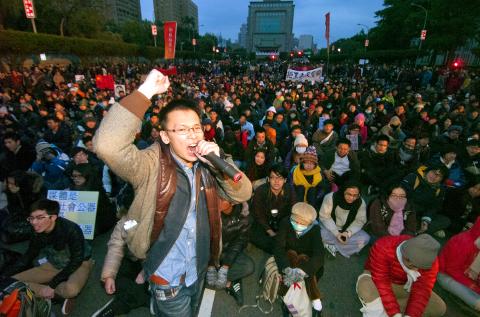|
FEATURE: Taiwanese
youth, students show they care
By Jason Pan / Staff writer, with CNA

About 1,000 demonstrators stage a
sit-in protest against media monopolization on Ketagalan Boulevard in front of
the Presidential Office in Taipei on New Year’s Day, asking President Ma Ying-jeou
to respond to their demands.
Photo: Wang Min-wei, Taipei Times
During the year-end celebrations,
Taiwanese youth and students showed they care about society and helping others
by initiating rallies and lending movements their boundless energy and
creativity, from picking up street trash and protesting against monopolization
of the media to supporting laid-off workers.
This is a dramatic change from the recent past, when youth and students often
gave the impression that they were self-indulgent, engaging in frivolous
activities, thrill-seeking, all-night parties and shallow celebrity worship.
However, the situation was markedly different at the New Year’s Eve event at the
plaza in front of Taipei City Hall. More than 100 young volunteers of the “Hug
the Earth with Smile Youth League,” donning bright red and yellow vests and
light sportswear, went through the partying crowds to pick up litter.
At the same time, members of the Tzu Chi Young Volunteers organization, which
consists of students from various colleges and universities, cleaned up venues
at five other New Year’s Eve events across the nation.
Shouting the slogan: “Your hands that click ‘Like’ on Facebook can also clean up
the environment,” they led by example to instruct people on sorting and
recycling different types of garbage.
Wang Jui-ming (王瑞明), a student who participated with the Tzu Chi Young
Volunteers, said that before, he thought New Year Eve’ events were only for
celebrating and having fun.
“This year, I joined with other volunteers to go into the crowds, sharing with
others how to protect the environment, how to cherish the earth’s limited
resources. We received lots of support and positive feedback. Now, I feel there
is hope for our earth’s future,” Wang said.
It was not just the environment that young people were concerned about. Hundreds
of students and supporters of the “Taiwan Youth Union of Anti-Media Monopoly”
gathered for an overnight vigil outside the gate of Liberty Square in Taipei,
and later proceeded with a sit-down protest on Ketagalan Boulevard in front of
the Presidential Office.
They raised their concerns with protests against the trend of media
organizations being bought up by conglomerates and concentrated in the hands of
a few tycoons, who often have ties to China.
Besides the leading figures of this students-against-media monopolization
movement, Chen Wei-ting (陳為廷) and Lin Fei-fan (林飛帆), the young people who showed
up to support this protest acquired information from BBS, Facebook, Plurk and
other social media sites. By doing so, these youths and students made their own
networking connections, and through their own initiatives, ,joined the event and
other social activist rallies.
Chen Cheng-liang (陳政亮), an assistant professor at Shih Hsin University’s
Graduate Institute for Social Transformation Studies, said that active
participation by students can be seen in the anti-media monopolization movement,
protests by laid-off workers and other demonstrations on social issues.
“With these actions in recent days, the young people have made a worthy end to
the year, encouraging everyone to reflect on and review the series of protests
and social movements this past year,” Chen said.
“The young people have made their voices heard. They called on both the ruling
and opposition political parties, as well as the media, to remember all these
movements of the past year. These series of protests and social movements have
been done with good strategy and planning throughout,” he added.
Chen said that active participation in and leading of social movements by
students have flourished with such an abundance of energy and wide participation
because of an accumulation of results through several years.
He said a number of the leading figures behind the student movements on social
issues have “fought many battles” to protest against government, big business,
exploitation and social injustice.
Chen listed these “battles” as including the fight to preserve Lo Sheng
Sanatorium in New Taipei City (新北市) against demolition, beginning in 2005; the
Wild Strawberries Student Movement of 2008 and 2009; environmental groups’
opposition to Kuokuang Petrochemical Refinery project in Changhua County
starting in 2008; the fight against the Miramar Resort project development on
the coast of Taitung County in recent years; protests against the demolition of
resident housing under the urban renewal project in Taipei’s Shilin District
(士林); and worker protests against Huanlong Textile Co in Miaoli County over
fraudulent bankruptcy and unpaid wages last year.
Chen Cheng-liang said the ability of students to organize movements, mobilize
and get their message out is becoming more mature, whereas government officials
and politicians from both major parties are slow to respond, or even display an
uncaring attitude or do not know how to respond.
Hsu Tao (徐韜), a spokesperson for the “Hug the Earth with Smile Youth League” and
a history major at the Tunghai University, said that in the past, student
movements tended to give people the impression of “angry youth” in action.
“Students have gradually changed their tactics in recent years. We are now
taking a gentle, proactive and positive approach. By using ‘hugs instead of
anger,’ our actions are more acceptable to the public,” Hsu said.
|
![]()
![]()
![]()